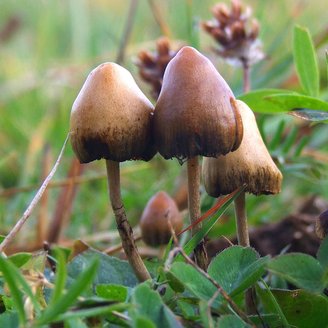“Do you see the world as a prison or a playground?”
— Matt
Johnson, mental health researcher, quoted in Michael Pollan’s How
to Change Your Mind.
###
PREVIOUSLY:
###
When medical trials of psychedelic substances to alleviate depression and addiction came to an abrupt halt in the 1960s, largely because of the excesses of the psychologist Timothy Leary (“the most dangerous man in America” according to Richard Nixon), a promising area of research closed off. The last ten years, however, have seen a reemergence of that research. Barring a new Tim Leary to screw things up, mental health professionals in the future will almost certainly have psychedelics as resources to draw upon.
Right now, treatment options for the mental problems that afflict nearly half of Americans at some point in their lives — depression, addiction, anxiety, bipolar, obsessive-compulsive disorder, schizophrenia, etc. — are few and of limited effectiveness. The promise of Prozac and other serotonin-boosting brain drugs—which perform barely better than placebos — has pretty much run out of steam; talk therapy and 12-step programs kinda-sorta work (most AA participants relapse); and it’s getting worse. Just one data point: in 2021, 9.7% of youth in the U.S. have severe major depression, compared to 9.2% in 2020. This should be enough to shout from the roof tops, “We need to do something different!”
That “something different” may well be the addition (after a 40-year hiatus) of “psychedelic-assisted therapy” to the tool chests of mental health workers. I’ve been reading Michael Pollan’s 2018 book How to Change Your Mind, a very readable account of how psychedelics, in particular psilocybin (which doesn’t carry the same political baggage as LSD), are showing terrific promise. (Here’s a worthy review.) Pollan devotes considerable space to psilocybin’s potential in treating depression, dementia and substance addiction, and in alleviating the fear of death in terminal cancer patients. The underlying idea is to “escape the prison of self,” as he puts it. I think anyone who has dropped acid or ingested shrooms (psilocybin mushrooms) will recognize this metaphor.

Psilocybe semilanceata aka magic mushrooms/shrooms. Photo: Arp, via Wikimedia. Creative Commons license.
Incidentally, Bill “W”
(Wilson), founder of Alcoholics Anonymous, wanted to introduce LSD
therapy into the organization in the 1950s, his own sobriety having
resulted from a mystical experience he’d had on belladonna (a
hallucinogenic) in 1934. Pollan writes of AA, “…the whole idea of
a spiritual awakening leading one to surrender to a ‘higher
power’…can be traced to a psychedelic drug trip.”
While the trials, mainly at NYU and Johns Hopkins, are preliminary and necessarily involve small numbers of volunteers, the results are, in a word, spectacular. For instance, 80 percent of cancer patients showed “clinically significant reductions in standard measures of anxiety and depression,” not just immediately after psilocybin sessions, but for months afterwards.
Or consider treatment for smoking, one of the hardest addictions to break, harder, perhaps, than heroin. Six months after a single psilocybin session, 80 percent of the volunteers — smokers who wanted to quit, but had been unable to do so — were abstinent. Quoting one, “The universe was so great and there were so many things you could do and see in it that killing yourself seemed like a dumb idea. It put smoking in a whole new context. Smoking seemed very unimportant; it seemed kind of stupid, to be honest.” Another put it even more succinctly: “Smoking became irrelevant, so I stopped.” According to one of the researchers, “The [psilocybin session] allows them to get some distance and see the bigger picture and to see the short-term pleasures of smoking in the larger, longer-term context of their lives.” Another says, “psychedelics open a window of mental flexibility in which people can let go of the mental models we use to organize reality.”
It’s early days, and the results of psychedelic-assisted therapy are preliminary, tentative and perhaps over-optimistic (plenty of people have taken psilocybin and still smoke!). But given the marginal effectiveness of the current options for treating mental disorders, we might be on the verge of a whole new world of alternatives.
Here’s how Imperial College (London) neuroscientist and psilocybin researcher Robin Carhart-Harris puts it: “A happy brain is a supple and flexible brain…depression, anxiety, obsession and the cravings of addiction are how it feels to have a brain that has become excessively rigid or fixed in its pathways and linkages — a brain with more order than is good for it.” Are psychedelics the answer to free up those brains? Maybe. Quoting yet another researcher, “The psychedelic journey may not give you what you want, but it will give you what you need.”
CLICK TO MANAGE